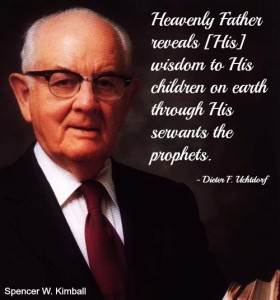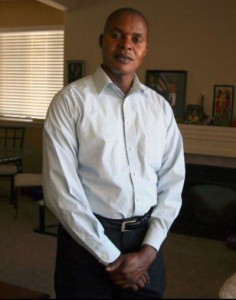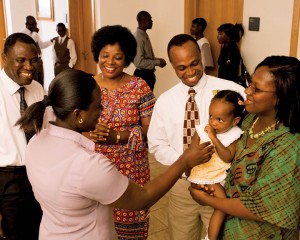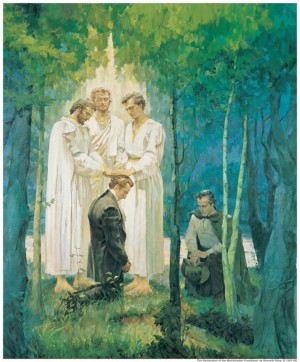For a period of time in the history of The Church of Jesus Christ of Latter-day Saints (inadvertently referred to as the Mormon Church by the media and others), male members of African descent were denied the privilege of bearing the priesthood. There has never been given any direct reasons as to why the restriction occurred, or how, or when, it became a policy of The Church of Jesus Christ. What some empirical research has shown, however, is that the lineage of an individual was more of a significant criteria for denying a person the priesthood, than his race, or the color of his skin.
Of monumental interest is that during the time of the priesthood restriction, by faith, and believing that one day every worthy male would be able to hold the priesthood, Blacks continued to become members of The Church of Jesus Christ. Male members of African descent served in various callings and magnified those callings, however, they could not administer priesthood blessings, or participate in the sacred ordinances of the temple.
The Church of Jesus Christ Does Not Condone Racism
 The fact that a priesthood restriction existed at one time in The Church of Jesus Christ that excluded male members of African descent, may cause some people to infer that the Church is racist, however, nothing could be further from the truth. The Church of Jesus Christ has always opened its doors and has always been accepting of any person, regardless of race, who is willing to embrace the teachings of the restored gospel of Jesus Christ, and who is willing to strive to live his life in accordance to the doctrines and principles found therein.
The fact that a priesthood restriction existed at one time in The Church of Jesus Christ that excluded male members of African descent, may cause some people to infer that the Church is racist, however, nothing could be further from the truth. The Church of Jesus Christ has always opened its doors and has always been accepting of any person, regardless of race, who is willing to embrace the teachings of the restored gospel of Jesus Christ, and who is willing to strive to live his life in accordance to the doctrines and principles found therein.
In keeping with the teachings of the gospel message, one of the fundamental teachings of The Church of Jesus Christ is that the gospel of Jesus Christ is for everyone. The Book of Mormon (a volume of scripture that is in complete harmony in its teachings as compared with the teachings of the Bible) which Latter-day Saints esteem as Another Testament of Jesus Christ teaches,
For none of these iniquities come of the Lord; for he doeth that which is good among the children of men; and he doeth nothing save it be plain unto the children of men; and he inviteth them all to come unto him and partake of his goodness; and he denieth none that come unto him, black and white, bond and free, male and female; and he remembereth the heathen; and all are alike unto God, both Jew and Gentile (2 Nephi 26:33.)
In an official statement released by The Church of Jesus Christ of Latter-day Saints in 2012, the position of the Church in regards to racism was reiterated. The statement reads as follows:
The gospel of Jesus Christ is for everyone. The Book of Mormon states, “black and white, bond and free, male and female; … all are alike unto God” (2 Nephi 26:33). This is the Church’s official teaching.
People of all races have always been welcomed and baptized into the Church since its beginning. In fact, by the end of his life in 1844 Joseph Smith, the founding prophet of The Church of Jesus Christ of Latter-day Saints, opposed slavery. During this time some black males were ordained to the priesthood. At some point the Church stopped ordaining male members of African descent, although there were a few exceptions. It is not known precisely why, how or when this restriction began in the Church, but it has ended. Church leaders sought divine guidance regarding the issue and more than three decades ago extended the priesthood to all worthy male members. The Church immediately began ordaining members to priesthood offices wherever they attended throughout the world.
The Church unequivocally condemns racism, including any and all past racism by individuals both inside and outside the Church. In 2006, then Church president Gordon B. Hinckley declared that “no man who makes disparaging remarks concerning those of another race can consider himself a true disciple of Christ. Nor can he consider himself to be in harmony with the teachings of the Church. Let us all recognize that each of us is a son or daughter of our Father in Heaven, who loves all of His children.” [1]
Seeking the Lord for Guidance, Inspiration, and Revelation
With the ever increasing membership of The Church of Jesus Christ worldwide, and with the work continuing to progress, in particular in the area of temple construction, the priesthood restriction weighed heavily on the mind of Spencer W. Kimball, the 12th President and Prophet of the Church. He counseled with his counselors as well as with the members of the Quorum of the Twelve Apostles (the second-highest presiding group within the Church of Jesus Christ) regarding the matter, and he also sought the direction of the Lord in moments of private meditation. After much discussion on the matter, the First Presidency and the Quorum of the Twelve Apostles went to the Lord in group prayer to obtain the guidance and direction needed.
The late, Elder Bruce R. McConkie then a member of the Quorum of the Twelve Apostles, recounted the following in his writing some time later:
It was during this prayer that the revelation came. The Spirit of the Lord rested upon us all; we felt something akin to what happened on the day of Pentecost and at the Kirtland Temple. From the midst of eternity, the voice of God, conveyed by the power of the Spirit, spoke to his prophet. The message was that the time had now come to offer the fullness of the everlasting gospel, including celestial marriage, and the priesthood, and the blessings of the temple, to all men, without reference to race or color, solely on the basis of personal worthiness. And we all heard the same voice, received the same message, and became personal witnesses that the word received was the mind and will and voice of the Lord (Kimball, Spencer W.; et al. (1981), Priesthood, Salt Lake City, Utah: Deseret Book, pp. 127–128.)
The late, Gordon B. Hinckley, the 15th President and Prophet of The Church of Jesus Christ of Latter-day Saints, then serving as a member of the Quorum of the Twelve Apostles, was also present at the prayer meeting. He recalled,
Not one of us who was present on that occasion was ever quite the same after that. Nor has the Church been quite the same. All of us knew that the time had come for a change and that the decision had come from the heavens. The answer was clear. There was perfect unity among us in our experience and in our understanding (Hinckley, Gordon B. (October 1988), “Priesthood Restoration“, Ensign: 69.)
The Long Promised Day Arrives
On June 9, 1978, the First Presidency of The Church of Jesus Christ released the following statement:
June 8, 1978
To all general and local priesthood officers of The Church of Jesus Christ of Latter-day Saints throughout the world:
Dear Brethren:
As we have witnessed the expansion of the work of the Lord over the earth, we have been grateful that people of many nations have responded to the message of the restored gospel, and have joined the Church in ever-increasing numbers. This, in turn, has inspired us with a desire to extend to every worthy member of the Church all of the privileges and blessings which the gospel affords.
Aware of the promises made by the prophets and presidents of the Church who have preceded us that at some time, in God’s eternal plan, all of our brethren who are worthy may receive the priesthood, and witnessing the faithfulness of those from whom the priesthood has been withheld, we have pleaded long and earnestly in behalf of these, our faithful brethren, spending many hours in the Upper Room of the Temple supplicating the Lord for divine guidance.
He has heard our prayers, and by revelation has confirmed that the long-promised day has come when every faithful, worthy man in the Church may receive the holy priesthood, with power to exercise its divine authority, and enjoy with his loved ones every blessing that flows there from, including the blessings of the temple. Accordingly, all worthy male members of the Church may be ordained to the priesthood without regard for race or color. Priesthood leaders are instructed to follow the policy of carefully interviewing all candidates for ordination to either the Aaronic or the Melchizedek Priesthood to ensure that they meet the established standards for worthiness.
We declare with soberness that the Lord has now made known his will for the blessing of all his children throughout the earth who will hearken to the voice of his authorized servants, and prepare themselves to receive every blessing of the gospel.
Sincerely yours,
Spencer W. Kimball
N. Eldon Tanner
Marion G. Romney
The First Presidency
This statement is recorded as part of Latter-day scripture, at the end of the Doctrine and Covenants as Official Declaration 2. On 30 September 1978, at the 148th Semiannual General Conference of The Church of Jesus Christ, following the reading of the statement by N. Eldon Tanner, at that time serving as First Counselor in the First Presidency of the Church, a sustaining vote was called from the congregation to accept the revelation “as the word and will of the Lord.” The vote was found to be unanimous in the affirmative.
Celebrating 35 Years – To God be the Glory
 It has been 35 years since the revelation was received by a prophet of the Lord that all worthy male members of the Church, regardless of race, or skin color, could be ordained to the priesthood and partake of the full blessings thereof. Many members of the Church still recall that momentous day of 9 June 1978, and how they felt when they heard the announcement. One of those members is Darius Gray, former president of the Genesis Group, who commented, “That’s something that had been hoped for and longed for decades, but I thought it wouldn’t happen in my lifetime so the first part was surprise.” [2] Another member, Winston Wilkinson stated, “I hear a lot of things about the priesthood and why there was a ban and all that. I would tend to say personally, just to look forward.” [2]
It has been 35 years since the revelation was received by a prophet of the Lord that all worthy male members of the Church, regardless of race, or skin color, could be ordained to the priesthood and partake of the full blessings thereof. Many members of the Church still recall that momentous day of 9 June 1978, and how they felt when they heard the announcement. One of those members is Darius Gray, former president of the Genesis Group, who commented, “That’s something that had been hoped for and longed for decades, but I thought it wouldn’t happen in my lifetime so the first part was surprise.” [2] Another member, Winston Wilkinson stated, “I hear a lot of things about the priesthood and why there was a ban and all that. I would tend to say personally, just to look forward.” [2]
Three months ago, Church leaders added historical context to the 1978 revelation. In the 2013 editions of Latter-day Saint scriptures, it reads:
During Joseph Smith’s lifetime, a few Black male members of the Church were ordained to the priesthood. Early in its history, Church leaders stopped conferring the priesthood on Black males of African descent. Church records offer no clear insights into the origins of this practice. [2]
Darius Gray further stated regarding the 1978 revelation,
Some of that language from the political speech is harming. And we need to be careful. We are children of the same God. We are literally brothers and sisters and people don’t think about that.
We have a dynamic faith, a living church with living leaders, prophets and there’s always going to be change. And there’s going to be change on this issue, I’m sure, as well. [2]
Additional Resources:
Worship with a Local LDS Congregation
About Keith L. Brown
Keith L. Brown is a convert to The Church of Jesus Christ of Latter-day Saints, having been born and raised Baptist. He was studying to be a Baptist minister at the time of his conversion to the LDS faith. He was baptized on 10 March 1998 in Reykjavik, Iceland while serving on active duty in the United States Navy in Keflavic, Iceland. He currently serves as the First Assistant to the High Priest Group for the Annapolis, Maryland Ward. He is a 30-year honorably retired United States Navy Veteran.



